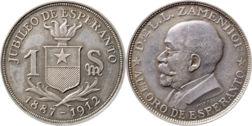Spesmilo
 1₷ coin | |
| Unit | |
|---|---|
| Plural | spesmiloj |
| Symbol | ₷ |
| This infobox shows the latest status before this currency was rendered obsolete. | |
The spesmilo (pronounced [spesˈmilo], plural spesmiloj [spesˈmiloi̯]) is an obsolete decimal international currency, proposed in 1907 by René de Saussure and used before World War I by a few British and Swiss banks, primarily the Ĉekbanko Esperantista.
The spesmilo was equivalent to one thousand spesoj, and worth 0.733 grams (0.0259 oz) of pure gold (0.8 grams of 22 karat gold), which at the time was about one-half United States dollar, two shillings (one-tenth of a pound sterling) in Britain, one Russian ruble, or 2+1⁄2 Swiss francs. On 6 November 2022, that quantity of gold would be worth about US$43.50,[1] £38 sterling,[2] €44,[3] ₽2692 Russian roubles,[4] and SFr 43 Swiss francs.[5]
The basic unit, the speso (from Italian spesa or German Spesen;[6] spesmilo is Esperanto for "a thousand pennies"), was purposely made very small to avoid fractions.
Sign

The spesmilo sign, called spesmilsigno in Esperanto, is a monogram of a cursive capital "S", from whose tail emerges an "m".[7] The currency sign is often typeset as the separate letters Sm.[8]
In Unicode, the character is assigned U+20B7 ₷ SPESMILO SIGN[9] in version 5.2.[10]
Miscellaneous
- The stelo was another currency unit used by the Universal League from 1942 to the 1990s.
- An Esperanto version of the board game Monopoly uses play money in denominations of spesmiloj.[11]
References
- ^ [1]. 6 November 2022
- ^ [2]. 6 November 2022.
- ^ [3]. 6 November 2022.
- ^ [4]. 6 January 2022.
- ^ [5] Archived 2016-08-26 at the Wayback Machine. 19 January 2014.
- ^ Cherpillod, André (2007). Konciza Etimologia Vortaro (in Esperanto). Universala Esperanto-Asocio. p. 432. ISBN 9789290170822.
- ^ Proposal to encode the Esperanto SPESMILO SIGN in the UCS, by Michael Everson
- ^ Esperanto and the Dream of a World Currency Archived 2007-09-26 at the Wayback Machine
- ^ Proposed New Characters – Pipeline Table
- ^ Andrew West, BabelStone: What's new in Unicode 5.2? Archived 2009-10-05 at the Wayback Machine
- ^ Monopolo
